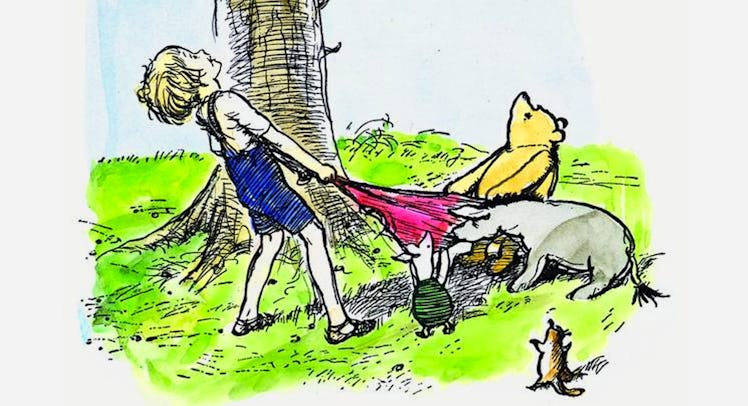‘The House at Pooh Corner’ Has the Best Ending of a Novel, Ever
Before you see 'Christopher Robin,' here's how the story really ended.

Winnie-the-Pooh is so ubiquitous and beloved it’s easy to forget that there are only two canonical Pooh novels by A.A. Milne. Though Pooh makes cameos in Milne’s books When We Were Very Young and Now We Are Six, the twin volumes Winnie-the-Pooh, and The House at Pooh Corner comprise basically the entirety of the Pooh canon. Pooh was not intended to be intellectual property, a protagonist on an endless series of profitable “expositions.” The House at Pooh Corner was supposed to be the end of it. And the end of House at Pooh Corner, one of the most devastatingly perfect endings ever put to paper, is all the more striking for that fact.
The Pooh books consist of comically long chapter titles and the last chapter of The House at Pooh Corner is no exception. It’s called “Chapter Ten, In Which Christopher Robin and Pooh Come to an Enchanted Place and We Leave Them There.” Already, if you have any soul at all, that last part is a gut-punch. And we leave them there. This is it! Christopher Robin is saying goodbye to childhood, while Pooh, his imaginary childhood friend, faces mortality in the form of indifference. When Christopher Robin insists nothing will change between he and Pooh, readers know this is not the case. The boy is leaving the bear, despite assurances that they’ll still be together when they are 99 and 100 respectively.
The fact that Christopher Robin has no choice but to change is the subtext to the chapter and the tragedy at the core of the book. The fact that this recognition of time comes suddenly at the end of a book that is, in many ways, about timelessness, is what makes the ending so smart and so devastating. The House at Pooh Corner ends with a sly meditation on growing up that is both structurally surprising and so deftly handled that it never takes away from the other adventures contained in the novel. Milne manages to have Christopher Robin prepare to leave Pooh without devaluing their relationship.
Pooh is a childish thing and must be put away, but Milne makes it clear that this is not a weakness or indictment of Pooh. The bear can’t change. The boy must. Innocence is always innocence and growth is anything but. Milne’s vision is humane and generous to both the stuffed animal and the young man, but it is also unflinching. No attempt is made to soften the blow. The end of The House at Pooh Corner is deeply sad. It’s supposed to be.
Like all Pooh prose, there’s a great philosophical section of the final chapter in which Pooh considers existence through the lens of honey:
Because although Eating Honey was a very good thing to do, there was a moment just before you began to eat it which was better than when you were, but he didn’t know what it was called.
For the reader, Pooh’s short disquisition on anticipation underlines the fact that a great book is nearly over and there’s little left to look forward to. We, the readers are about to finish the honey, too and we’re not ready yet. In this way, Milne abandons the reader as Christopher Robin abandons Pooh. At least both Milne and Christopher Robin have the good grace to — after a fashion, anyway — apologize.
“Pooh” said Christopher Robin earnestly, “if I — if I’m not quite —” he stopped and tried again — “Pooh, whatever happens, you will understand, won’t you?”
Pooh asks what it is he’s supposed to understand, Christopher Robin just laughs and says “Oh, nothing!” There are things that children don’t admit to others because they can’t admit them to themselves. Christopher Robin will never see the 100 Acre Wood the same way. It’s slipping and he’s letting it go.
The new film Christopher Robin (out this weekend from Disney) will show a version of what happens to Pooh and his best friend when they pick up their relationship decades later. The movie represents pure wish fulfillment in that it is built on the idea that Christopher Robin could and would pick that relationship back up if given the chance. The movie will likely be a fun watch, but its existence is at odds with Milne’s art, which was made more powerful by his willingness to sidestep emotional resolution and platitudes. The ending of House at Pooh Corner seems perfectly designed to spare us the image of Pooh and his boy-turned-man throwing sticks in a river. And that fact says more about movie studios than it does about Pooh or Milne.
And maybe it says something about us as well. There will be an audience for the movie, probably a big one because there are many adults who want to believe they can get back to where they once belonged. In fact, they can’t and Milne knew it. He believed in the immortality of beautiful moments, not constancy of bonds. He believed that Pooh had done enough. Thus the immortal final line, which rejects time, but grudgingly accepts the distance between childhood and everything else.
…wherever they go, and whatever happens to them on the way, in that enchanted place, on the top of the Forest, a little boy and his Bear will always be playing.
Christopher Robin is out in theaters this Friday. A.A. Milne’s books are available on Amazon and Barnes and Noble right here.
This article was originally published on